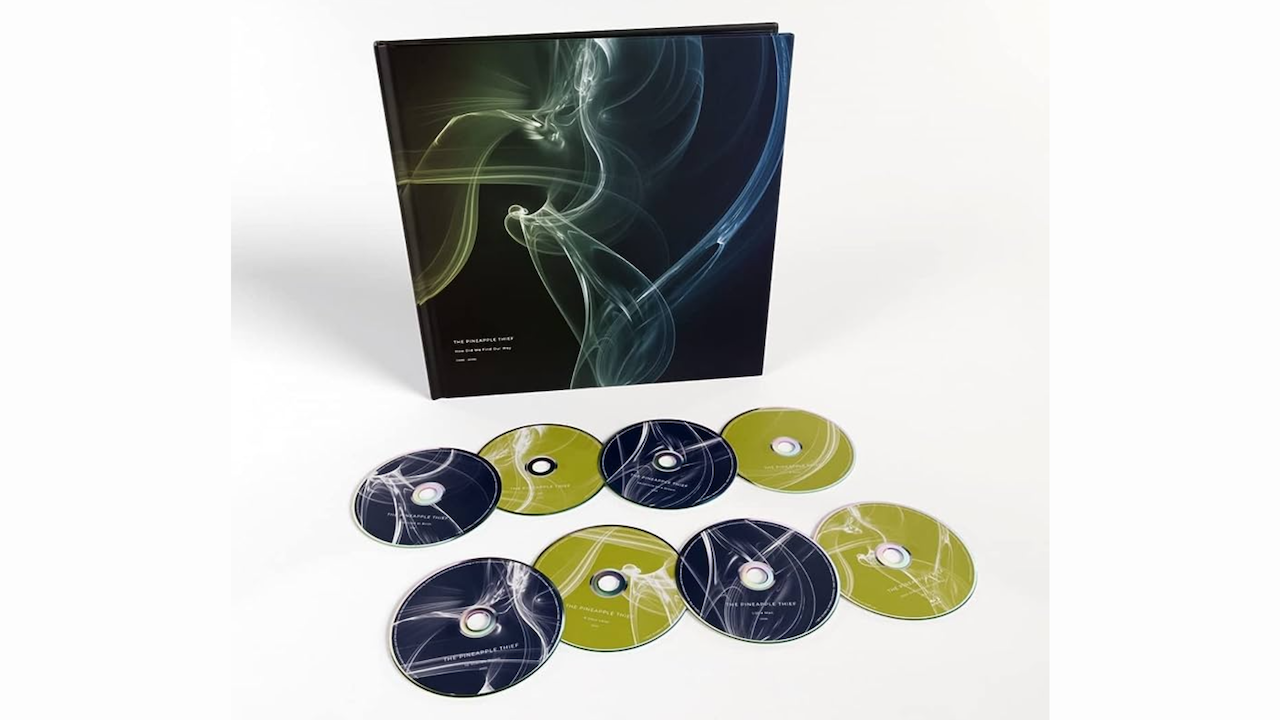The phrase “growing up in public” is an ever more appropriate description of many acts’ career arcs in the 21st century, as they are snapped up by management after only a few gigs, signed and hyped before even releasing their debut single, with little room to develop away from the spotlight.
The result can often be short-lived, firework careers, so The Pineapple Thief were perhaps fortunate to avoid that fate after Bruce Soord adopted the name in 1999. By then he was already in his late 20s and, as he explains on the illuminating book of sleeve notes housing this retrospective, he had also released a couple of albums on prog-loving indie label Cyclops as Vulgar Unicorn, with school friend Neil Randall. As Soord and Randall diverged creatively, TPT was born, and collected here are the first five albums he made on Cyclops before signing with Kscope, on fan Steven Wilson’s recommendation.
To this day, TPT bill themselves as an “alternative rock band”, determinedly keeping their boundaries as wide open as possible, and that may be a reflection of their difficulty marketing themselves early on. From the start, it’s clear why Soord’s work (initially pretty much as a one-man operation) was, as the sleeve notes ruefully acknowledge, “either ‘too progressive’ or ‘not progressive enough’”.
He also admits of his debut album Abducting The Unicorn – here renamed Abducted At Birth, its original title – that certain influences were looming large. One being Smashing Pumpkins; the strangulated, anguished vocal style of Billy Corgan and the epic concept-leaning post-grunge fare of Mellon Collie And The Infinite Sadness seeps into Soord’s evolving performance style on tracks such as Punish Me.
Yet the 19-minute Parted Forever, punctuated by soaring guitar excursions, shows which way his ambitions lie. Likewise, on that record and 2002’s 137, there are distinct echoes of Mansun’s epically inclined outsider art-rock on tracks such as Warm Me and Doppler. At the same time, Perpetual Night Shift and How Did We Find Our Way demonstrate Soord’s burgeoning talent for his own melancholic melodies.
It’s on 2003’s Variations On A Dream that The Pineapple Thief’s sound really begins to take shape. There’s an intoxicating dreamrock feel to the lovelorn Vapour Trails and the ringing guitar textures of The Bitter Pill. Meanwhile, Soord was challenging himself creatively with projects such as 8 Days. Released as bonus material for a limited-edition Kscope reissue of VOAD, and included here as a standalone album, it found Soord giving himself one day to write and record each of its various tracks, affording him a chance to experiment and resulting in the string-swollen post-rock of Sunday 20th October and Sunday November 10th’s wistful piano instrumentation. The previously unheard material added to this package is equally strong, including the how-did-this-never-get-released-before? Running Empty, a stirring slice of grunge-inflected art-pop.
10 Stories Down is an audible step forward from its predecessors, Steve Kitch’s role as keyboard player and now engineer is felt keenly in moments such as the electric piano and languid electronic beats of the gorgeously slow-burning ballad I Will Light Up Your Eyes. Meanwhile, a sequel to 8 Days would come out as a bonus disc alongside early editions of that album, in the form of 8 Days Later, with Soord this time incorporating ambient background noise into his track-per-day compositions.
They add atmosphere to the sweet harmonies of Friday: 5 Minutes and the acoustic yearning of Wednesday: Snail Song. And once again, among the bonus tracks there’s gold that seems to have been left in cold storage, such as the screeching guitar-led angst-rock of Catch The Jumping Fool.
But it’s 2006’s Little Man that’s the pick of the eight discs here (one of which is a Blu-ray featuring Dolby Atmos and hi-res stereo mixes). Opener Dead In The Water has a haunting quality, which is only deepened by Soord’s explanation of how the song evolved. It was originally intended as an elegy for lost love as Soord feared his relationship with girlfriend Liz was ending, even though she was pregnant at the time. However, she then gave birth prematurely and the couple’s baby son died after just five days, at which point this and other songs Soord was writing took on
a new emotional dimension. Just as that track saw him proclaiming undying love despite circumstances beyond anyone’s control, Snowdrops would also emerge, an acoustic-led meditation that Soord explains as “easing your eventual demise by appreciating the love around you”.
It’s a fine way to end the first chapter of The Pineapple Thief’s career, and it would offer just a glimpse of what they have since become capable of.
Buy How Did We Find Our Way? from Burning Shed

